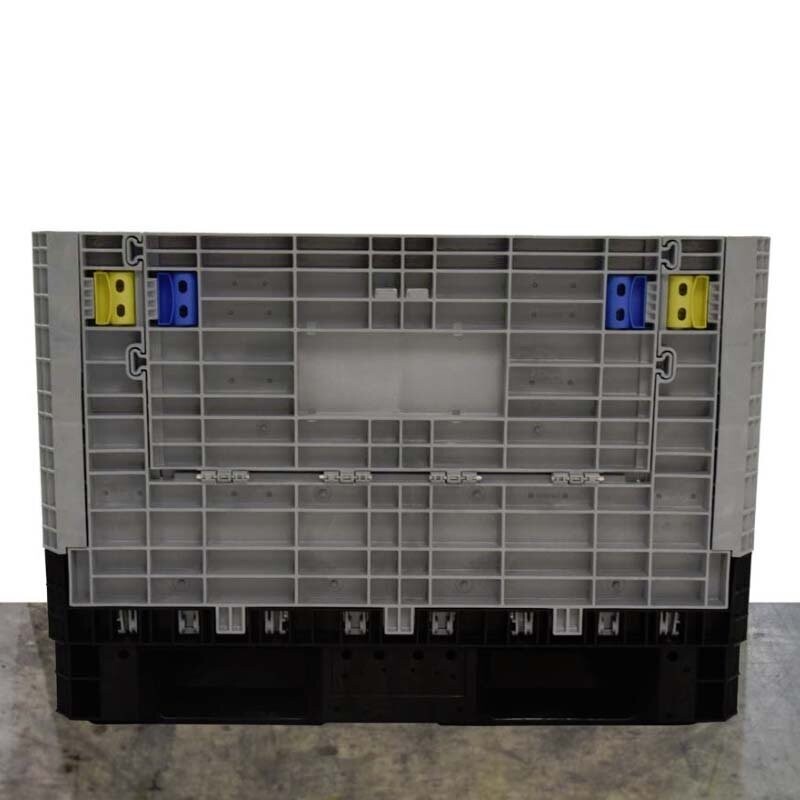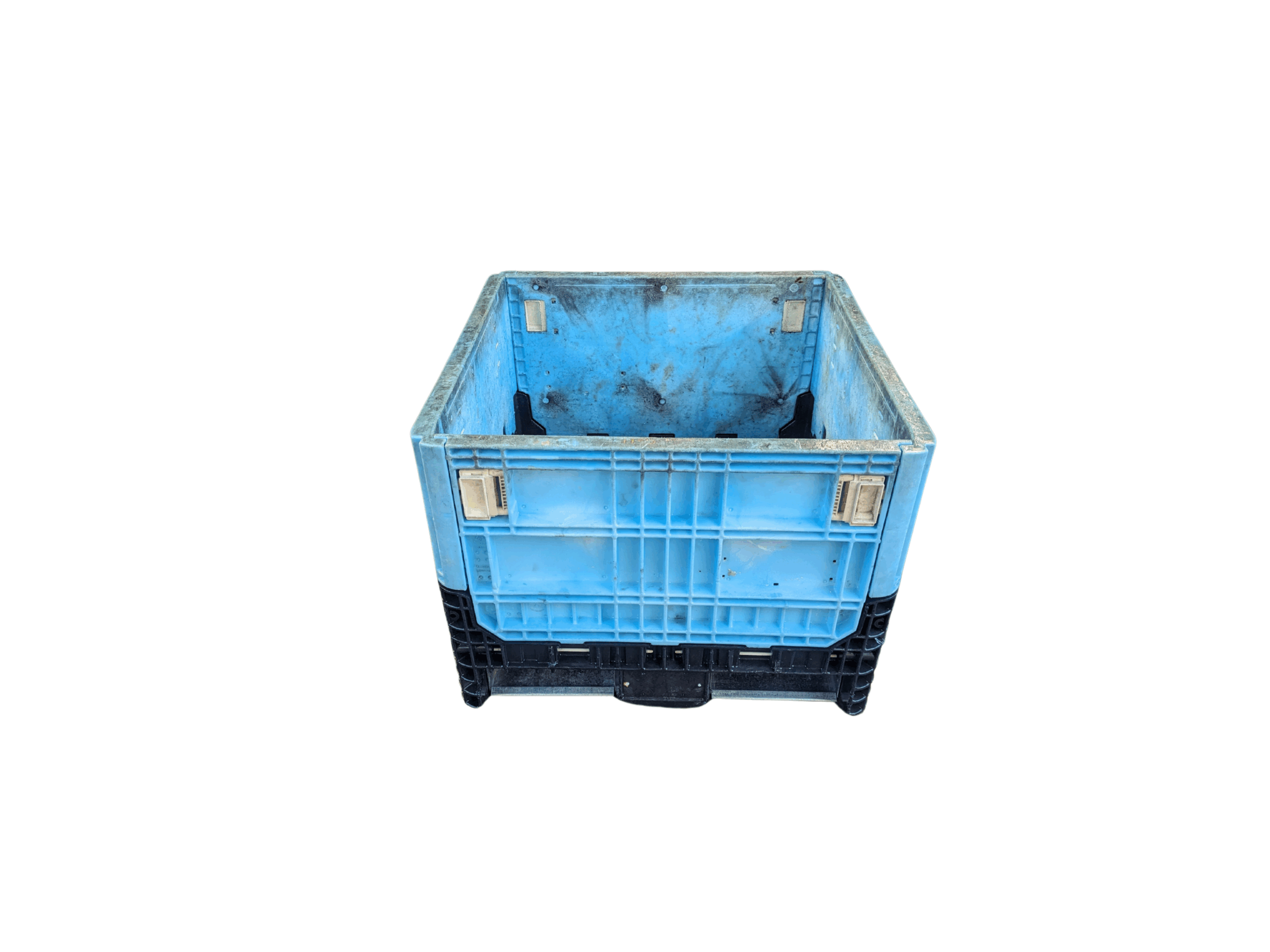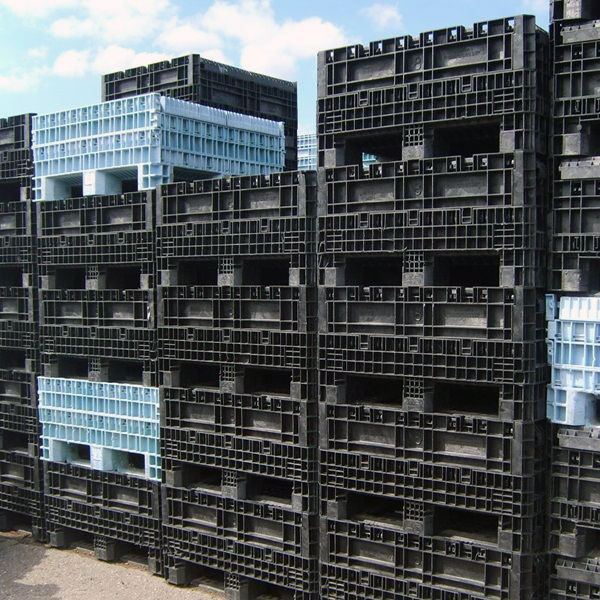Why refurbished bulk containers and used collapsible bulk containers are valuable assets
Wiki Article
Why Mass Containers Are Crucial for Lasting and Cost-efficient Transportation
Bulk containers play a necessary function in modern-day logistics. They promote the effective motion of big amounts of goods, consequently optimizing transportation processes. This approach not just minimizes costs yet also reduces ecological influence via lower exhausts and waste generation. As industries look for even more sustainable methods, the fostering of bulk containers is ending up being significantly substantial. What effects does this shift hold for future logistics and supply chain management?
The Benefits of Making Use Of Mass Containers in Logistics
Mass containers change logistics by enhancing efficiency and sustainability. These containers enable the transportation of big quantities of goods in a single journey, considerably lowering the number of trips called for. This not only simplifies operations yet additionally decreases labor costs connected with handling, packing, and discharging. Furthermore, mass containers are developed to optimize space usage within transport lorries, ensuring that more products can be shipped concurrently.The standardization of mass containers likewise streamlines the logistics process. With uniform measurements, they can be quickly piled and kept, bring about improved warehouse monitoring. Mass containers commonly include sturdy materials that secure materials from damage throughout transportation, consequently decreasing product loss and boosting total integrity. As a result, services can experience boosted supply chain performance, inevitably resulting in boosted profitability and consumer satisfaction. This combination of variables makes mass containers an essential possession in modern logistics.
Ecological Influence: Minimizing Waste and Carbon Footprint
As markets increasingly prioritize sustainability, the adoption of bulk containers has actually arised as a vital strategy for decreasing waste and reducing carbon footprints. These containers decrease making use of packaging materials, such as boxes and plastic, consequently especially lowering general waste generation. By consolidating shipments, mass containers improve transportation effectiveness, permitting more items to be delivered per trip. This reduction in journeys directly correlates with lower greenhouse gas emissions, contributing to a smaller sized carbon impact.Additionally, bulk containers can commonly be reused or reused, even more reducing environmental effect. The longevity of these containers assurances they can withstand multiple transportation cycles, lowering the requirement for single-use choices. used collapsible containers. By streamlining logistics and promoting efficient resource usage, mass containers not just sustain lasting practices however likewise urge industries to straighten with international ecological objectives. Eventually, their application mirrors a commitment to eco-friendly stewardship and liable resource monitoring
Price Savings: How Mass Containers Lower Transport Costs
While numerous business look for methods to boost their bottom line, using mass containers presents a substantial chance for reducing transportation costs. Mass containers make the most of the volume of goods delivered, allowing organizations to ship larger amounts simultaneously. This effectiveness decreases the variety of trips required, straight reducing gas expenses and decreasing labor expenditures connected with loading and discharging.Additionally, bulk containers often include structured styles that maximize space use within transport cars. This means fewer vacant spaces, bring about more reliable use of offered ability. Furthermore, the sturdiness of bulk containers can decrease the threat of item damages during transportation, ensuring and decreasing losses that even more items arrive undamaged.
Enhancing Supply Chain Efficiency With Bulk Storage Solutions
Mass storage remedies play a crucial duty in enhancing supply chain effectiveness by maximizing stock management. By consolidating items into less, bigger containers, services can substantially minimize handling expenses related to regular transfers and processing. This structured approach enables far better tracking and administration of inventory, ultimately resulting in enhanced operational performance.Streamlined Supply Management
Effective supply administration is necessary for enhancing supply chain operations, specifically when companies take on bulk storage options. These remedies enable companies to keep higher supply degrees while minimizing the frequency of replenishment. By combining products right into mass containers, firms can enhance their stock procedures, decreasing the intricacy connected with tracking numerous smaller plans. This strategy promotes precise inventory counts and boosts forecasting precision, permitting more enlightened decision-making. Furthermore, mass storage space services simplify storage facility company, making it easier to locate and access items when needed. As a result, organizations can achieve a much more effective inventory turnover price, ultimately enhancing total supply chain efficiency and minimizing the chance of stockouts or overstock situations.
Decreased Handling Expenses
The execution of bulk storage space remedies not only improves stock monitoring but likewise significantly lowers dealing with costs across the supply chain. By settling materials into bulk containers, business minimize the need for regular handling and transfer between different storage and transport systems. This method lowers labor costs related to loading, dumping, and moving smaller sized packages. Additionally, mass storage minimizes the frequency of deliveries, resulting in lower transport expenses and decreased fuel usage. Consequently, organizations can maximize their logistics procedures, enabling an extra effective appropriation of resources. Eventually, reduced dealing with prices add to weblink boosted overall supply chain effectiveness, fostering an atmosphere that supports both sustainability and economic feasibility.
Flexibility of Mass Containers Throughout Numerous Industries
Many markets have unique demands for transport and storage space, bulk containers have arised as a functional service that fulfills a large array of browse around this site needs. These containers, varying from large bins to specialized tanks, can fit varied materials, consisting of powders, granules, and fluids. In the farming industry, mass containers assist in the transportation of fertilizers and grains, while the food and drink industry utilizes them for active ingredients and completed items. The chemical sector counts on bulk containers for safely moving hazardous products, ensuring conformity with security guidelines. Furthermore, construction firms take advantage of mass containers for moving accumulations and various other products. Their flexibility expands to numerous modes of transport, including trucks, ships, and trains, enhancing logistical effectiveness. This flexibility not just streamlines procedures throughout various fields yet additionally promotes sustainability by lowering product packaging waste and optimizing area en route. For that reason, bulk containers play an important role in modern supply chain monitoring.Future Fads wholesale Container Usage and Sustainability
The future of bulk container usage is progressively shaped by cutting-edge products growth that enhances sustainability. Additionally, automation in logistics promises to improve operations, lowering waste and boosting effectiveness. Accepting round economic climate practices will certainly even more transform how bulk containers are developed, made use of, and reused, fostering an extra sustainable transport landscape.Ingenious Products Growth
As industries increasingly prioritize sustainability, innovative products development wholesale containers arises as a substantial variable in enhancing environment-friendly transport options. Scientists and suppliers are checking out biodegradable plastics, recycled composites, and lightweight steels to minimize environmental impact. These materials not only minimize waste however likewise enhance fuel performance by reducing the total weight of containers. Additionally, find this advancements in wise products, which can adapt to differing problems, enhance the sturdiness and functionality of bulk containers. The combination of these ingenious products aligns with circular economy concepts, promoting reuse and recycling. As the need for sustainable methods grows, the advancement of such products will certainly play an important role fit the future of bulk container usage in logistics and transport.Automation in Logistics
Substantial improvements in automation are poised to transform logistics and the application of mass containers, improving sustainability in transportation. Automated systems, including drones and self-governing vehicles, are streamlining the movement of mass containers, decreasing the dependence on conventional fuel-powered transport. These technologies optimize transmitting and filling processes, minimizing vacant miles and enhancing fuel performance. In addition, automated inventory management systems boost tracking and tracking of bulk containers, guaranteeing better resource allotment and lowered waste. The combination of the Net of Points (IoT) permits real-time information analysis, enabling positive decision-making that lines up with sustainability goals. As automation remains to progress, it is expected to drive even more technologies in mass container use, ultimately sustaining more lasting logistics practices and minimizing the ecological impact of transport.Circular Economic Situation Practices
Innovations in automation are establishing the phase for a much more incorporated method to round economy techniques in the domain of bulk container usage. As industries increasingly welcome sustainability, bulk containers are being designed for long life and reusability. This shift not only lessens waste yet also improves source performance. Companies are taking on methods such as closed-loop systems, where used containers are collected, reconditioned, and reintroduced right into the supply chain. In addition, wise innovations track container life cycles, assisting in far better monitoring and lowering environmental effect. The partnership in between manufacturers, logistics carriers, and end-users is vital in developing criteria for sustainable container usage. refurbished bulk containers. Future fads indicate a growing emphasis on products that are naturally degradable and recyclable, further reinforcing the round economic climate's concepts in bulk transport
Regularly Asked Questions
What Products Are Bulk Containers Generally Made From?
Bulk containers are typically constructed from sturdy materials such as high-density polyethylene, steel, light weight aluminum, and cardboard. These materials supply convenience, strength, and defense, making them ideal for carrying numerous items in different sectors efficiently.Exactly how Do I Pick the Right Size Mass Container?
Selecting the appropriate size mass container includes examining the volume of materials to be delivered, taking into consideration handling devices compatibility, and evaluating storage space demands. Correct size guarantees performance in transportation and reduces waste throughout shipment.Are Mass Containers Reusable or Recyclable?
Bulk containers are commonly reusable, created for multiple trips, improving sustainability. Several can likewise be recycled, relying on the products made use of. Choosing recyclable options better minimizes and supports ecological goals waste in transportation methods.What Safety And Security Regulations Put On Bulk Container Transport?
Safety and security regulations for mass container transport consist of conformity with the Department of Transportation standards, proper labeling of hazardous materials, architectural integrity assessments, and adherence to weight restrictions to ensure secure handling and protect against mishaps throughout transit.Exactly How Can Companies Transition to Making Use Of Bulk Containers Properly?
Organizations can change to bulk containers by evaluating existing logistics, educating staff on handling, purchasing appropriate tools, enhancing inventory management, and collaborating with providers to assure compatibility and performance throughout the supply chain.
As markets progressively focus on sustainability, the adoption of bulk containers has emerged as an essential technique for lowering waste and lowering carbon impacts. By combining materials right into bulk containers, firms can simplify their supply procedures, reducing the complexity connected with tracking several smaller sized packages. As industries progressively focus on sustainability, ingenious materials advancement in bulk containers emerges as a substantial element in improving environmentally friendly transport services. Automated systems, including drones and self-governing automobiles, are enhancing the movement of bulk containers, lowering the dependence on traditional fuel-powered transport. In addition, automated stock management systems boost tracking and monitoring of bulk containers, guaranteeing much better source allowance and reduced waste.
Report this wiki page